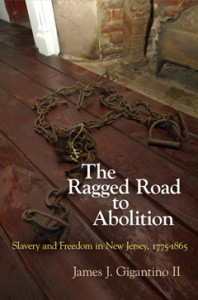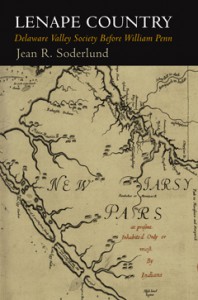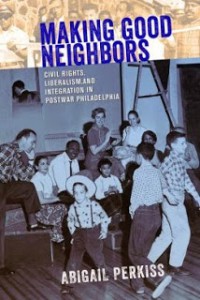 James Gigantino, the author of our essay about Slavery and the Slave Trade, has published his new research about slavery and abolition in New Jersey in a book from the University of Pennsylvania Press, The Ragged Road to Abolition: Slavery and Freedom in New Jersey, 1775-1865.
James Gigantino, the author of our essay about Slavery and the Slave Trade, has published his new research about slavery and abolition in New Jersey in a book from the University of Pennsylvania Press, The Ragged Road to Abolition: Slavery and Freedom in New Jersey, 1775-1865.
Congratulations, Jim!
Here is the publisher’s description of the book:
Contrary to popular perception, slavery persisted in the North well into the nineteenth century. This was especially the case in New Jersey, the last northern state to pass an abolition statute, in 1804. Because of the nature of the law, which freed children born to enslaved mothers only after they had served their mother’s master for more than two decades, slavery continued in New Jersey through the Civil War. Passage of the Thirteenth Amendment in 1865 finally destroyed its last vestiges.
The Ragged Road to Abolition chronicles the experiences of slaves and free blacks, as well as abolitionists and slaveholders, during slavery’s slow northern death. Abolition in New Jersey during the American Revolution was a contested battle, in which constant economic devastation and fears of freed blacks overrunning the state government limited their ability to gain freedom. New Jersey’s gradual abolition law kept at least a quarter of the state’s black population in some degree of bondage until the 1830s. The sustained presence of slavery limited African American community formation and forced Jersey blacks to structure their households around multiple gradations of freedom while allowing New Jersey slaveholders to participate in the interstate slave trade until the 1850s. Slavery’s persistence dulled white understanding of the meaning of black freedom and helped whites to associate “black” with “slave,” enabling the further marginalization of New Jersey’s growing free black population.
By demonstrating how deeply slavery influenced the political, economic, and social life of blacks and whites in New Jersey, this illuminating study shatters the perceived easy dichotomies between North and South or free states and slave states at the onset of the Civil War.
 In 1631, when the Dutch tried to develop plantation agriculture in the Delaware Valley, the Lenape Indians destroyed the colony of Swanendael and killed its residents. The Natives and Dutch quickly negotiated peace, avoiding an extended war through diplomacy and trade. The Lenapes preserved their political sovereignty for the next fifty years as Dutch, Swedish, Finnish, and English colonists settled the Delaware Valley. The European outposts did not approach the size and strength of those in Virginia, New England, and New Netherland. Even after thousands of Quakers arrived in West New Jersey and Pennsylvania in the late 1670s and ’80s, the region successfully avoided war for another seventy-five years.
In 1631, when the Dutch tried to develop plantation agriculture in the Delaware Valley, the Lenape Indians destroyed the colony of Swanendael and killed its residents. The Natives and Dutch quickly negotiated peace, avoiding an extended war through diplomacy and trade. The Lenapes preserved their political sovereignty for the next fifty years as Dutch, Swedish, Finnish, and English colonists settled the Delaware Valley. The European outposts did not approach the size and strength of those in Virginia, New England, and New Netherland. Even after thousands of Quakers arrived in West New Jersey and Pennsylvania in the late 1670s and ’80s, the region successfully avoided war for another seventy-five years.